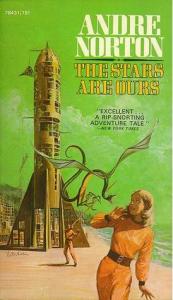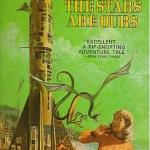Dard’s eyes were on the painted cliffs but inwardly he saw beyond—across the wide and waiting land. Alliance with the merpeople—taming of the land—building a new civilization—his breath came faster. Why a lifetime was not going to be time enough to do everything that even he could see had to be done. Could their breed be defeated? He gave his answer to the uncertain future with a single word: “NO!”*
That is how the secularism of my childhood looked at life: scientism combined with optimism and secular humanism. The humanism, a gift of Judaism and Christianity, was good, but the scientism could not sustain the morals needed. Science gave us “is,” but as we gained power over other people through science, we need to know what we “ought” to do. Sadly, “is” never gives us “ought.”
Scientists, often lightly trained in the humanities, drifted for a while on inherited Christian culture. As the Christianity leeched out of each generation, factions invented their own morality and claimed “science” as the defense for every move. Racism? Scientific! Anti-racism? Scientific!
As we filled the oceans with plastic, fought ever more deadly wars, and discovered that the chief country run on scientistic, secularist ideas turned out to be a woeful tyranny, the old secularism failed. We moved from optimism about the future (better living through chemistry!) to fearful pessimism.
 Scientism was never very defensible.
Scientism was never very defensible.
Scientism failed and the confidence of The Stars are Ours and other Golden Age science fiction (mostly) vanished this side of Star Trek.
Partly this is because scientism is perfectly defensible in a twenty-five cent paperback, but unable to account for the human in human life when the cheap paperback philosophy hits real life. Scientism was foolish philosophy. The doctrine that only the “scientific method” could produce knowledge had trouble even being self-referentially coherent. (Was the proposition “science is the only way to know truth” known to be true scientifically? Or was scientism philosophy that dare not speak its name?)
Worse, there was more than a whiff of racism and sexism in who got to do “science” under the old secular regime.
The Old Secularism and Race
The old popular secularism mostly shed the racism, even leading the way in social change. The roots are still problematic: HP Lovecraft remains a huge influence in the science fiction/fantasy genres despite his overt racism. Sexism never got worked out and the old secularism was gone before progress could be made. Fortunately, if scientists were convinced that racism was not scientific, then racism was rejected by these old style secularists. The fact that racism also had been defended as scientific showed an important limit of scientism.
Why?
Didn’t the rejection of particular scientific theories of race show science is “self-correcting?”
Sort of.
Particular scientific theories undergirding racism could be falsified, but that did not show that a man should not prefer his “own race.” Science could not give anyone an “ought,” only tell what “is.” The evils of Nazi eugenics and race theory and resistance from oppressed people groups helped make leftist, secularist racism much less common. A book like The Stars are Ours had, by the standards of the era, hints at a multi-ethnic (and racial?) future.
A great good of the old secularism was (in America) generally standing for integration and racial equality. The difficulty was that after this cause, driven by the overwhelmingly Christian African-American community, the old secularists lost their way. They knew injustice existed.
How could they should mercy? Could they show mercy? What of the past?
The old secularism gave way to a new generation that saw science, scientists, engineering, and engineers as part of the problem. These had remained (and still in some areas do remain) bastions of males and for a long time white males. What was the relationship of science to this situation? What is science?
These are questions scientism could not even form, let alone address. Too often the old secularists just hunkered down and sneered until the actuary tables and funding cuts undermined their position.
The Religion that Failed: Creation, Fall, Redemption, Eschaton
The old secularism had a creation myth: the scientific revolution. At the dawn of civilization, men of science turned from myths to science. The ancients made great progress, but then came the fall. The Jews and Christians set back progress by indoctrinating the world in nonsense. Books were burned. Philosophers were killed for defending free thought. Progress died.
Yet truth could not be hidden. Men kept thinking and eventually the man of science was reborn. He rose up against dogma and there was light. The man of science had defied the powers of the Church and the dark ages. Some became martyrs for science, but the truth had conquered.** Science redeemed: spreading health and prosperity everywhere saving us from our bodily failings.
Yet danger lurks! Armies of the night might sweep us back to the dark ages. Still at the end of history ad Astra! The stars are ours!
Andre Norton gives us this story straight up.
The “big brains” (a phrase used in the book) do Science, the practical men are engineers, and everyone else worthwhile uses the Science to do big stuff. There were moral messages to be told: The Stars are Ours begins on a dystopian Earth (Terra!) where conservatives (mostly bad) have retreated from Science (really bad) and are plunging Terra back to the “dark ages.” There are few questions with answers that Science cannot answer and people, at least those dedicated to Science, were going to answer them.
Could we be stopped?
No!
Yet in the world outside the cheap paperback, we were stopped. The money is easier outside of the rigor of the laboratory. Why research yourself when you can hire the people to do the research?
ad Astra?
The moon is full of rocks, but on our portable devices we can (quickly! easily!) go to interesting planets and earn points, coins, and power ups. The creators make cash and we are entertained. The constraints of science on our story telling, just like the constraints of morality, are cast aside.
Worst of all, the scientists themselves showed no ability to guide or sustain us. Of course, they could not. That is not what science does! Yet having been given a role science could not maintain, the result was not good. Science maintained a kind of pragmatic prestige: we get cool toys from science.
We might not be spending much on NASA, but our engineers are building most excellent theme park rides. Andre Norton pointed us to the stars and what we got was Harry Potter.***
Before concluding, I should note that Norton did not make all the mistakes of most Golden Age writers. In part, this was her particular genius, but surely it was also (partly) due to being a different voice. She was a woman writing in a “man’s field.”
Andre Norton in a Different Voice
The Stars are Ours is part of the old American secularism that failed and mostly repeats the doctrines, tropes, and errors of the movement. However, Andre Alice Norton, provided a different voice from the male dominated industry. Leave aside if there is a a “different voice”for women, noting only that Norton was writing as an “outsider.”
As a woman, she was a first and only so often! Is it any wonder that she gives a strong voice to the loner? She gives a great gift in her demand that humanism be expanded to animals and other species. She knows marginalization and shows greater sensitivity than one often finds for the marginal. The Stars are Ours and “ours” is broader than the usual suspects.
The old secularism still exists and was even revived (a bit) by the “new atheists.” Christopher Hitchens had the broader education some of the 1950’s and 1960’s secularists had. Richard Dawkins can double down on scientism without any sense of irony having missed the last half century of philosophical development. By learning nothing, he can still believe the old time secularism. Atheism and secularism, more generally, is not (for good and bad) what it once was, however.
There are secularists who believe in heaven. Atheists who squint and see “life forces.” As for ad Astra, we lack the confidence that we are people. I suspect that many young secularists, untainted by the new (really the old) atheism, would hope the aliens kill us, not the other way around.
The new secularism is pessimistic, angry (not optimistic), and skeptical of science. It is enough to make you miss the best of Andre Norton, that different voice.
——————————————-
*Andre Norton, The Stars are Ours, Kindle edition.
**That none of this was true did not matter. Even today on social media, you can find grownups who buy the myth of the dark ages.
***I obviously love Potter, but the world of Potter is a new secularism opposed to the old. The scientism is gone, leaving a hole in the center of the worldview.












